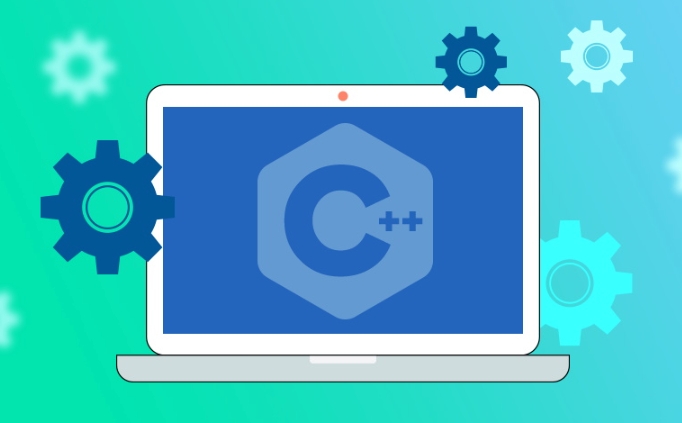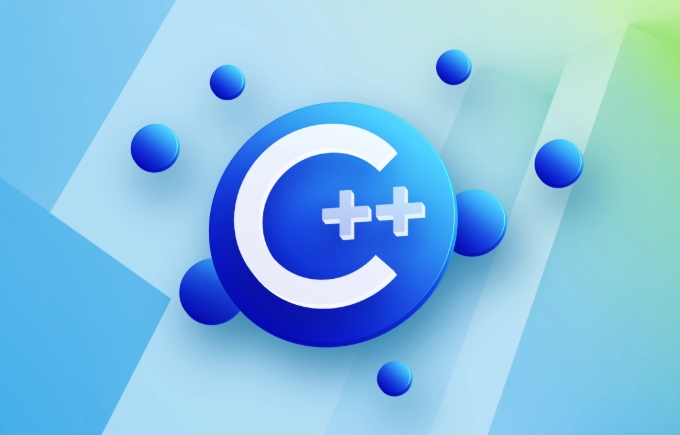What are some good beginner C projects to build a portfolio?
Jul 09, 2025 am 01:57 AMFor beginners who are just starting out with C, it is recommended to start with simple but challenging projects to consolidate skills and demonstrate abilities. 1. Simple calculator: implements basic functions such as addition, subtraction, multiplication and division, and can advanced support for bracket analysis, floating point number calculation and error processing, and try to separate logic and interaction to improve the code structure; 2. File management or text processing tools: such as counting the number of characters and words in text, implementing the search and replacement function, and be familiar with file flow and STL containers; 3. Simple database or student management system: Practice object-oriented programming, use class encapsulation information, realize the addition, deletion, modification and query of data, and try to simulate table connections; 4. Mini game development: such as guessing numbers, tic toe, Tetris, etc., exercise logical thinking and state management capabilities, and frequently use loops, judgments and data structures. These projects can be gradually deepened according to interests and progress, focusing on quality rather than quantity, which truly reflects the understanding and hands-on ability of C.

If you are just starting to learn C and want to consolidate your skills and demonstrate your abilities through projects, it is best to start with a simple but challenging small project. These projects do not need to be too complex, but they must reflect your understanding of language and problem-solving skills. Below are some C project suggestions for beginners, which can be practiced and conveniently placed into the portfolio.

1. Simple Calculator
This is one of the most classic introductory projects, but don't underestimate it. A well-made calculator can show you how to master the basic concepts such as functions, classes, exception handling, etc.

- Basic addition, subtraction, multiplication and division functions can be realized first
- Advanced: Added bracket analysis, support for floating point numbers, and error input processing
- If you want to make the interface more friendly, you can use the command line menu or try a simple graphical interface library (such as SFML)
Tips: Try to write the operation logic and user interaction parts separately, so that the code structure will be clearer and easier to expand.
2. File manager or text processing tool
C is very suitable for system-level operations, such as reading and writing files, statistics content, replacing keywords, etc. You can do one:

- Text file content statistician (statistic number of characters, word number, line number)
- File content search and replacement tools
- Simple log analyzer (such as extracting content from specific keywords)
Projects in this direction can familiarize you with file streams (fstream), string processing, and some practical STL containers (such as maps and vectors).
3. Simple database or student management system
This type of project can help you practice object-oriented programming (OOP), such as using features such as classes, objects, and inheritance.
- Functions include adding records, querying, modifying, and deleting data
- Data can be saved in memory or written to files
- Use classes to encapsulate information about "student" or "products"
Want to improve further? You can try to simulate table joins using structures or class combinations, such as establishing associations between a course class and a student class.
4. Mini games: guess numbers, tic toe, Tetris, etc.
Game development is a very interesting direction and can also exercise your logical thinking and state management skills.
- Number guessing game: randomly generate a number, let the user guess, and give a prompt
- Console version of tic toe chess: Two people take turns to play chess to determine the outcome
- A more advanced one can try the console version of Snake or Tetris
This type of project will allow you to frequently use loops, conditional judgments, arrays/vectors, etc., and is a good opportunity for comprehensive training.
In fact, you don’t have to pursue coolness from the beginning when choosing a project. The key is that it can reflect your understanding of C and hands-on ability. The above projects can be gradually deepened according to your own interests and learning progress.
Basically, it’s all. Pick one or two and finish it carefully, which is more valuable than just making tens of them with a simple taste.
The above is the detailed content of What are some good beginner C projects to build a portfolio?. For more information, please follow other related articles on the PHP Chinese website!

Hot AI Tools

Undress AI Tool
Undress images for free

Undresser.AI Undress
AI-powered app for creating realistic nude photos

AI Clothes Remover
Online AI tool for removing clothes from photos.

Clothoff.io
AI clothes remover

Video Face Swap
Swap faces in any video effortlessly with our completely free AI face swap tool!

Hot Article

Hot Tools

Notepad++7.3.1
Easy-to-use and free code editor

SublimeText3 Chinese version
Chinese version, very easy to use

Zend Studio 13.0.1
Powerful PHP integrated development environment

Dreamweaver CS6
Visual web development tools

SublimeText3 Mac version
God-level code editing software (SublimeText3)

Hot Topics
 C Polymorphism: Enhancing Code Reusability and Flexibility
Jun 10, 2025 am 12:04 AM
C Polymorphism: Enhancing Code Reusability and Flexibility
Jun 10, 2025 am 12:04 AM
Polymorphism in C is implemented through virtual functions and abstract classes, enhancing the reusability and flexibility of the code. 1) Virtual functions allow derived classes to override base class methods, 2) Abstract classes define interfaces, and force derived classes to implement certain methods. This mechanism makes the code more flexible and scalable, but attention should be paid to its possible increase in runtime overhead and code complexity.
 C Polymorphism : is function overloading a kind of polymorphism?
Jun 20, 2025 am 12:05 AM
C Polymorphism : is function overloading a kind of polymorphism?
Jun 20, 2025 am 12:05 AM
Yes, function overloading is a polymorphic form in C, specifically compile-time polymorphism. 1. Function overload allows multiple functions with the same name but different parameter lists. 2. The compiler decides which function to call at compile time based on the provided parameters. 3. Unlike runtime polymorphism, function overloading has no extra overhead at runtime, and is simple to implement but less flexible.
 C Destructors code samples
Jun 13, 2025 am 12:04 AM
C Destructors code samples
Jun 13, 2025 am 12:04 AM
The destructor in C is used to free the resources occupied by the object. 1) They are automatically called at the end of the object's life cycle, such as leaving scope or using delete. 2) Resource management, exception security and performance optimization should be considered during design. 3) Avoid throwing exceptions in the destructor and use RAII mode to ensure resource release. 4) Define a virtual destructor in the base class to ensure that the derived class objects are properly destroyed. 5) Performance optimization can be achieved through object pools or smart pointers. 6) Keep the destructor thread safe and concise, and focus on resource release.
 How to Implement Polymorphism in C : A Step-by-Step Tutorial
Jun 14, 2025 am 12:02 AM
How to Implement Polymorphism in C : A Step-by-Step Tutorial
Jun 14, 2025 am 12:02 AM
Implementing polymorphism in C can be achieved through the following steps: 1) use inheritance and virtual functions, 2) define a base class containing virtual functions, 3) rewrite these virtual functions by derived classes, and 4) call these functions using base class pointers or references. Polymorphism allows different types of objects to be treated as objects of the same basis type, thereby improving code flexibility and maintainability.
 What Are the Different Kinds of Polymorphism in C ? Explained
Jun 20, 2025 am 12:08 AM
What Are the Different Kinds of Polymorphism in C ? Explained
Jun 20, 2025 am 12:08 AM
C has two main polymorphic types: compile-time polymorphism and run-time polymorphism. 1. Compilation-time polymorphism is implemented through function overloading and templates, providing high efficiency but may lead to code bloating. 2. Runtime polymorphism is implemented through virtual functions and inheritance, providing flexibility but performance overhead.
 C : Is Polymorphism really useful?
Jun 20, 2025 am 12:01 AM
C : Is Polymorphism really useful?
Jun 20, 2025 am 12:01 AM
Yes, polymorphisms in C are very useful. 1) It provides flexibility to allow easy addition of new types; 2) promotes code reuse and reduces duplication; 3) simplifies maintenance, making the code easier to expand and adapt to changes. Despite performance and memory management challenges, its advantages are particularly significant in complex systems.
 C Destructors: Common Errors
Jun 20, 2025 am 12:12 AM
C Destructors: Common Errors
Jun 20, 2025 am 12:12 AM
C destructorscanleadtoseveralcommonerrors.Toavoidthem:1)Preventdoubledeletionbysettingpointerstonullptrorusingsmartpointers.2)Handleexceptionsindestructorsbycatchingandloggingthem.3)Usevirtualdestructorsinbaseclassesforproperpolymorphicdestruction.4
 Polymorphism in C : A Comprehensive Guide with Examples
Jun 21, 2025 am 12:11 AM
Polymorphism in C : A Comprehensive Guide with Examples
Jun 21, 2025 am 12:11 AM
Polymorphisms in C are divided into runtime polymorphisms and compile-time polymorphisms. 1. Runtime polymorphism is implemented through virtual functions, allowing the correct method to be called dynamically at runtime. 2. Compilation-time polymorphism is implemented through function overloading and templates, providing higher performance and flexibility.






